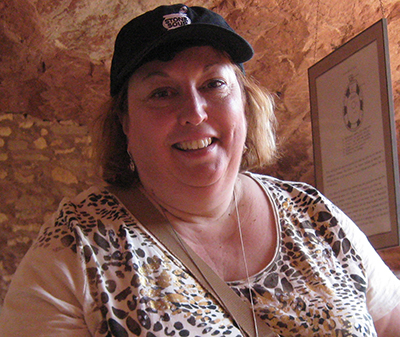
Barbara Wahlberg
Barbara Wahlberg can trace her passion for teaching the Holocaust back to one breakfast in Long Island, New York.
She was at a restaurant with her husband when she noticed something unusual about the cook who brought out their food: he had a number tattooed on his arm.
She asked her husband what it was, and he told her it meant that the man had been in a concentration camp in Europe during World War II. Wahlberg had never heard of these tattoos, and was shocked that this man – so tall and strong – had experienced such an injustice.
But the magnitude of what he and other Holocaust survivors and victims went through hit her years later, when she was a student teacher and read Night by Elie Wiesel for the first time.
“That whole image of the short order cook, this big man with the numbers, it just came back to me,” Wahlberg said. The experience changed her life, and from then on, teaching the Holocaust became a priority in her career as an educator.
Twenty-five years later, Wahlberg is still committed to teaching about the Holocaust. As part of that commitment, she will come to Los Angeles this July as one of the first IWitness Summer Teacher Fellows. Wahlberg and the other fellows will spend three days at the USC Shoah Foundation office working with the Institute’s education staff to learn more about IWitness and develop new activities.
In addition to teaching at Cranston East High School in Rhode island, Wahlberg is involved with a number of educational and teaching organizations. She is the Rhode Island Policy Analyst of the National Council of Teachers of English, the Poetry Chair for the New England Association of Teachers of English, and a board member of the Holocaust Education and Resource Center of Rhode Island, where she is on the education committee and has presented numerous workshops over the years. In 2002, Wahlberg was a Teaching Fellow at the United States Holocaust Memorial Museum, and has used this fellowship by presenting educational workshops on the Holocaust at the local and regional level.
She began using IWitness in her 10th grade English class after attending an IWitness educator workshop last summer. Wahlberg’s students watched testimony about Auschwitz as an introduction to Night, and they also each made their own videos in the My Story Matters activity. Wahlberg said she was impressed by her students’ work, and was excited to bring technology into the classroom through a new platform.
“I was thrilled because I never thought I could do that with my kids,” Wahlberg said. “Just the thrill of doing something different made it worth my while.”
Wahlberg said she wanted to participate in the IWitness Summer Teacher Fellowship because she is dedicated to outreach and professional development, both for herself and fellow educators. She felt the program would improve her own ability to help other teachers learn to use IWitness.
“I would like to become better at teaching them, not just someone learning along with them but be a better practitioner for professional development as a teacher imparting this to other teachers,” Wahlberg said. “[IWitness] has really changed the way I thought about teaching the Holocaust.”